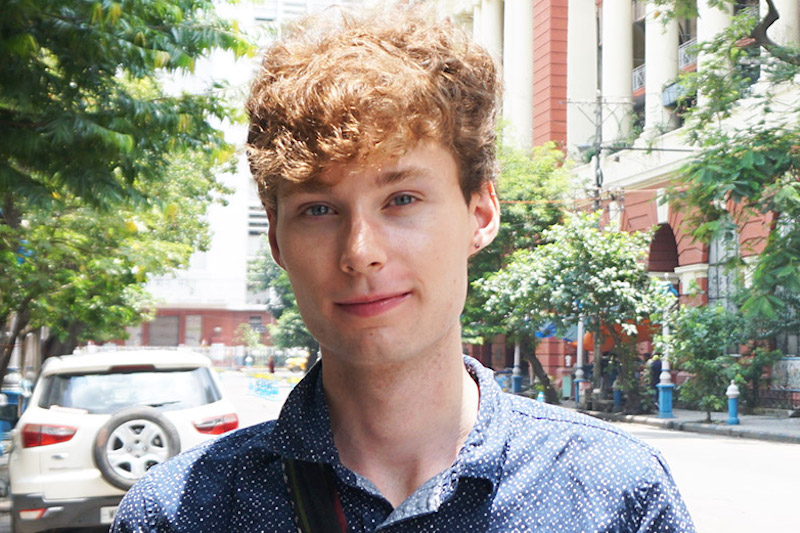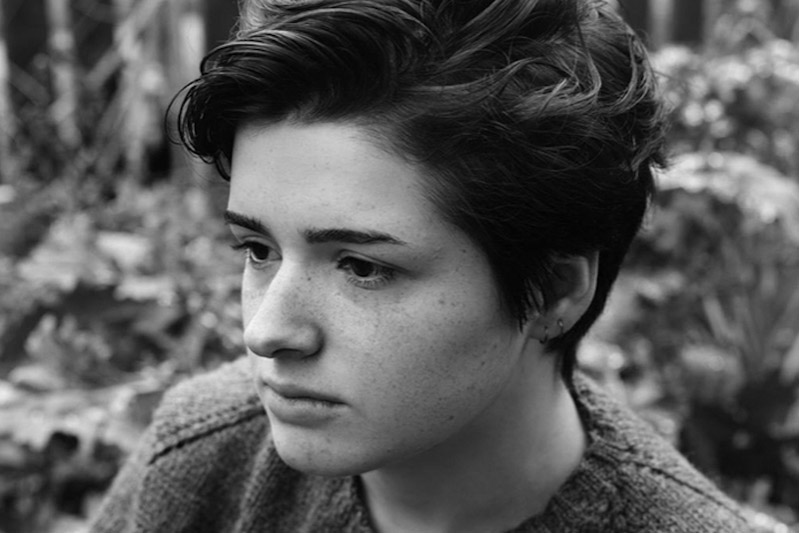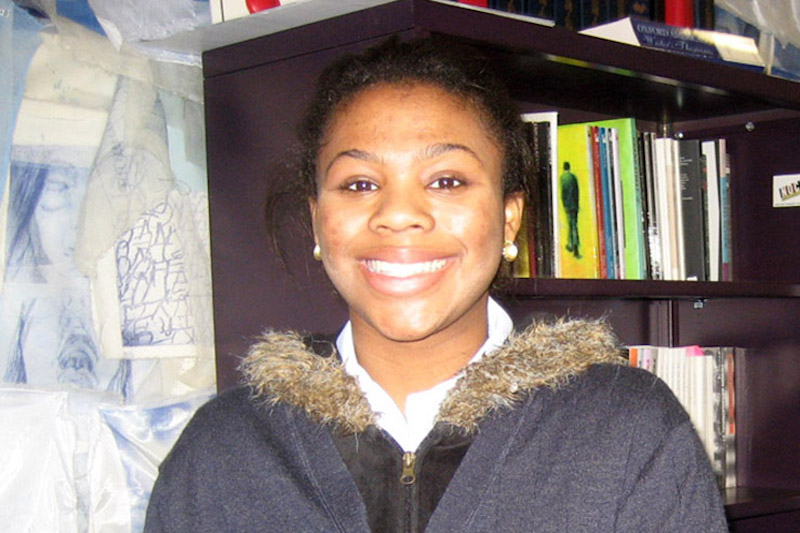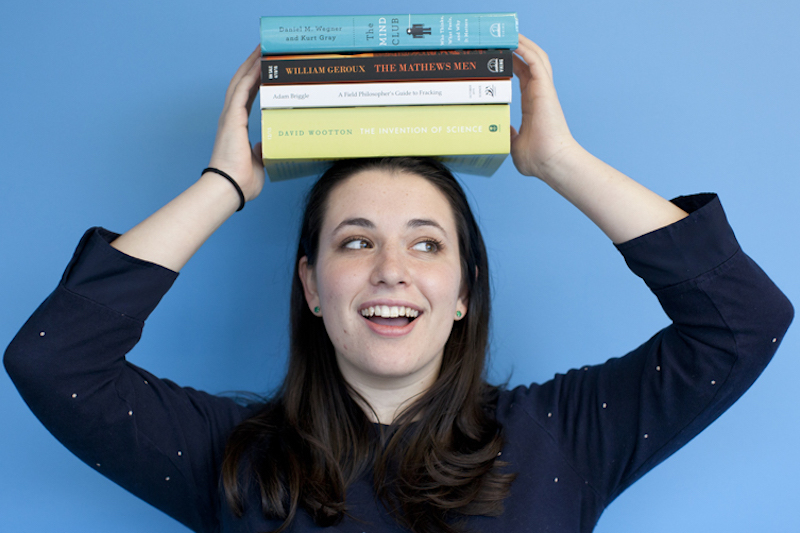Student Stories
-
 Evan TimsWhen Evan Tims first toured Bard, he was drawn to the College’s Written Arts and Environmental and Urban Studies programs. “I just had a strong feeling that it was a place I was supposed to be,” he says. “I’m glad I listened.”
Evan TimsWhen Evan Tims first toured Bard, he was drawn to the College’s Written Arts and Environmental and Urban Studies programs. “I just had a strong feeling that it was a place I was supposed to be,” he says. “I’m glad I listened.”Evan Tims

When Evan Tims first toured Bard, he was drawn to the College’s Written Arts and Environmental and Urban Studies programs. “I just had a strong feeling that it was a place I was supposed to be,” he says. “I’m glad I listened.”
At Bard, Evan’s interests were wide-ranging. “I switched around a lot between majors,” he says. “I planned on doing written arts and environmental and urban studies, spent some time in political studies, flirted with philosophy for a while. Ultimately, I did a joint major in human rights and written arts, and did most of my coursework in the Anthropology department. I was never really happy just sticking with one subject, so I just followed my interests throughout a variety of methodologies.”
It was through taking this route that Evan arrived back at two of his loves— writing and environmental studies. “My main passion coalesced around climate change,” he says. “Specifically, I became interested in how climate change is reflected through literature and other cultural formats, and how it poses a kind of epistemological threat to forms of academic thinking and even conventional literary structures.”
Evan’s interest in climate change is a lens he uses to view the rest of the world. “I’m especially interested in the different temporalities of climate change in modern life— how we buy life insurance despite knowing that the world will fundamentally change in the next 30 to 40 years, and how we think our life plans are somehow distinct from broader societal shifts in relation to the environment,” he says. “Eventually I realized that, for me, climate change is ‘the’ topic—it’s the focus of my creative work, my academic studies, and most of my personal thinking. But I’m always trying to find ways of approaching it sideways—that is, through culture and creative thought more than through conventional scientific understandings.”
For his Senior Project, Evan combined research and creative writing to produce a hybrid piece about climate change that included a philosophical and anthropological survey, as well as a collection of short stories. “My stories are mostly set in a general near-future, and the characters are learning to live with the knowledge that their world has changed,” he says. “Typically, I find that climate fiction is almost exclusively an apocalyptic genre, which has its own tropes and politics about survival and the value of society, and I wanted to skirt around most of that and contend with climate change as a broader regime shift in how people view themselves and the world around them.”
For the past two summers, Evan has been studying Bengali in Kolkata, India, and he hopes to do ethnographic and literary research in South Asia. “I got to witness firsthand the kinds of immediate impacts of climate change that aren’t as visible in the U.S.,” he says, “and I had the chance to engage with the rich literary tradition of Bengal, which has influenced a lot of my work.”
Evan plans to spend the next few years focusing on writing and submitting his creative work. He also has a novel about climate change planned out, would like to spend more time in South Asia, and is thinking about graduate school programs in cultural anthropology. “I’d like to combine writing and ethnography to do interdisciplinary work,” he says. “After that, I’m not sure—but I know I’ll always keep writing.” -
 Geneva ZaneRaised in the Hudson Valley, Geneva Zane was initially attracted to Bard by the unconventional admissions approach, which includes the option to respond to a set of essay prompts—known as the Bard Entrance Exam—in lieu of submitting a traditional application.
Geneva ZaneRaised in the Hudson Valley, Geneva Zane was initially attracted to Bard by the unconventional admissions approach, which includes the option to respond to a set of essay prompts—known as the Bard Entrance Exam—in lieu of submitting a traditional application.Geneva Zane

Raised in the Hudson Valley, Geneva Zane was initially attracted to Bard by the unconventional admissions approach, which includes the option to respond to a set of essay prompts—known as the Bard Entrance Exam—in lieu of submitting a traditional application.
As a student, she was able to take a variety of classes outside of written arts. “I took a lot of music history courses as well as composition and performance. It was great to be in a space where I had no mastery, nor any expectation of mastery, as opposed to my senior project,” she says.
Geneva’s project, House God, won the prestigious Wilton Moore Lockwood Prize. She describes it as “a series of poetic essays cataloging different forms of internal and external worship, and the shape our beliefs take.”
Geneva also credits her 2014 internship with the Bard-based literary magazine Conjunctions as an influential experience. She describes the process of watching a publication operate as clarifying. Seeing publications from the inside “stripped them of their mystery and power,” she says.
Since graduating, Geneva has published a novel, Stringbean and the Grace of Dog, released in 2019 by Pink Narcissus Press. -
 Jada SmileyJada Smiley hails from New Orleans, Louisiana, where she grew up in the type of educational environment that made Bard feel familiar. “Bard had much of the liberal ethos I was used to,” she says. “I also came with nine other people who were from New Orleans, so it was a bit of a comfort zone for me.”
Jada SmileyJada Smiley hails from New Orleans, Louisiana, where she grew up in the type of educational environment that made Bard feel familiar. “Bard had much of the liberal ethos I was used to,” she says. “I also came with nine other people who were from New Orleans, so it was a bit of a comfort zone for me.”Jada Smiley

Jada Smiley hails from New Orleans, Louisiana, where she grew up in the type of educational environment that made Bard feel familiar. “Bard had much of the liberal ethos I was used to,” she says. “I also came with nine other people who were from New Orleans, so it was a bit of a comfort zone for me.”
Jada had been writing throughout high school, submitting to competitions and journals and going on to win a Faulkner Society prize and publish in Sleepingfish (now known as Calamari).
Once at Bard, Jada was drawn to the intimate feel of the Written Arts Program and the close connections with professors. “Michael Ives and Celia Bland were indispensable,” she says, “both in the writing of my senior project and in pursuit of a certain kind of voice and a certain kind of confidence.”
Jada’s Senior Project, “Free Running Brown Legs,” won the Written Arts Prize in 2018. When describing what it felt like to write it, Jada noted stages of frustration and liberation. “I felt slotted into a particular category, a particular style of writing, a particular voice. I think I just wanted to liberate myself through the use of language in general. I set out with a clean slate, and I kind of wiped my poetry of all preconceived notions of what I should be writing.” She studied everything from Buddhism to the German idealists, thinking all the while about how everything connected. “I couldn’t help but have a very global approach,” she says.
And she still remembers the guidance of her Senior Project adviser, Celia Bland. “Celia had read one of my works, which was kind of bogged down by imperious Oxford English Dictionary language. She told me: ‘Jada, someone needs to get a beer in your poem. There’s no breathing room.’ So she helped me open up the language a bit. There was absolutely no room for interpretation or even antagonization of the principles I was laying forth.”
After graduating, Jada has continued to revisit her Senior Project. “The poems are a work in progress, an exercise in chaos and letting things be and not censoring myself for the sake of sounding how I thought people wanted me to sound.” And Jada remains open to the way in which writing figures into her future. “I have many loves and interests,” she says, “and writing is certainly one of the top tier interests I have. It’s high on the priority list. I write every day.” -
 Naomi LaChanceNaomi LaChance grew up in Western Massachusetts, and decided to come to Bard when she realized that the Written Arts faculty members all have active careers as writers. She arrived with a strong interest in journalism, a career she’s now pursuing full-on.
Naomi LaChanceNaomi LaChance grew up in Western Massachusetts, and decided to come to Bard when she realized that the Written Arts faculty members all have active careers as writers. She arrived with a strong interest in journalism, a career she’s now pursuing full-on.Naomi LaChance

Naomi LaChance grew up in Western Massachusetts, and decided to come to Bard when she realized that the Written Arts faculty members all have active careers as writers. She arrived with a strong interest in journalism, a career she’s now pursuing full-on.
However, she says, “Along the way I developed an appreciation for lots of other ideas, which I really appreciate. I majored in history as well as in Written Arts, and a lot of my favorite classes were literature classes. There’s something really satisfying about picking apart a text. History and literature are both about interpretation, which I think is really cool.” Naomi also worked for three years at the Bard Learning Commons, offering academic support to her peers.
For Naomi’s Senior Project, she crafted “a nonfiction piece about media credibility. I looked at the story of the massacre at El Mozote in 1981, which was widely discredited as propaganda despite its being on the front page of the Washington Post and New York Times. (Bard professor Mark Danner finally showed it was true in the New Yorker in 1993.)” An extremely self-motivated student, Naomi completed this project while spending her last Bard semester interning at NPR in Washington, D.C. “I got to write about the news, collect audio for All Things Considered and Morning Edition, and go to Tiny Desk Concerts.”
She parlayed that experience into freelance journalism, writing for the Intercept, Motherboard, and NPR, and in June 2016 she accepted a prestigious internship at Intercept’s D.C. bureau covering national security and politics.
Senior Projects in Written Arts
More Senior Projects in Written Arts can be found at Bard Digital Commons.
Senior Projects 2018
- Chloe Barran: Get Your Gun: The Interplay between Firearms and Femininity
- Ana Bauer: How to Dredge a Lake
- Allison Berghahn: Basic, an anthology of short stories
- Erin Beuglass:A Series of Questions to Which Answers Will Not be Provided (with Included Glossary)
- Katherine Bonnie:Three Stars Make a Fully Plumed Bird
- Sarah Bosworth: Contact! A story about running
- Simone Brown: Jetsam/…And?
- Yuma Carpenter-New: KONVOLUT: I write the city
- John Carroll: Begin Again
- Peregrine Chase: The Golden Flake
- Bennett Chinsena: For the intruder in my home
- ClydaJane Dansdill: Biographical Accidents: On Injury, Tragedy, and Other Popular Sentiments of the Now
- Sawyer Dohman: Spearfish
- Jacob Dominus: The Jewish Suicides
- Raina Dziuk: The Delicatessen Kids
- Brigid Fister: Why the Sky Stays Up
- Thomas Gelfars: Under Normal Circumstances
- Juliet Hadid: Our Family Trees
- Duncan Hanrahan: Glimpses
- Elijah Jackson: A Country: A Map in 6 Towns and 35 Roads
- Gwyneth Jones: The Telos Cycle
- Aaron Krapf: Anecdotes
- Mackenzie Kristofco: Horizon’s Door
- Hannah Lomele: Coney Island Caviar
- Benjamin Malinski: Povest: A Story
- C Mandler: The Second Language:An Argument for the Superlative Authenticity of Poetry through the Complex Personal Relationships It Develops with Its Audiences by Way of Truth in Metaphor
- Loreli Mojia:Plantain Stain
- Zoe Morgan-Weinman: The Poem Will Resemble You: A Human-Computer Collaboration
- Acacia Nunes:Undefined: Theoretical and Personal Truths of a Mixed-Race Identity
- Emma Florence Popkin: Doylestown
- Reet Rannik: Este es el colmo
- LaVonne Roberts:Home: Memoir Excerpts
- Zoe Rohrich: The Psyche behind the Performance: Portraits of Classical Musicians
- Chloe Scala: The View from the House by the Ocean
- Noah Schwink-Zanella: Absent Interlocutor
- Jada Smiley: Free Running Brown Legs, winner of the Written Arts Prize
- Henry Smythe: The Estate
- Anna Sones: A Mere Heart of Stone: The Anti-Biography of Charles Darwin
- Sienna Thompson: Lost Girls
- Geneva Zane: House God, winner of the Wilton Moore Lockwood Prize
Senior Projects 2017
- Alexander Junius Adams: Dark World It Yourself
- Benjamin Peters Adam-Keane: Pierce
- Terrence Suraj Arjoon: the even passage of the sun, a collection of poems centered around being, technology, histories, and memories
- Matthew Louis Balik: Stories That I’ve Heard Before, a fictional narrative about a family home in New Jersey
- Alejandro Alberto Castro: Salvador Fellini Presents: A Most Unfortunate Combination
- Caridad Jacqueline Cole: The Family Arcane, a collection of interconnected short stories
- Johanna Marie Costigan: Sins, Omissions, and Alibis, a collection of fiction, nonfiction, and poetry
- Robert Crane: The Transformation of Material Things, a series of essays
- Marita Carole Dancy: A Hole Cut Out from the World, a collection of poems
- Natalie Marie Desrosiers: Toward a Black Radical Revival
- Kristin Taylor Dishmon, How to Get Home from Here, a novella
- Lila Taylor Dunlap: The Sea Comes Back, a collection of poetry
- Cleo Rose Egnal: The Manor House, a novel
- Horton Alexander Fisher: A Drunken Odyssey: Comparative Translations of Nonnus and Homer
- Abigail Rose Freaney: Snake Eyes, a novella
- Madeline Gwenyth Hopfield: Rotations
- Kelsey L. Johnson: Slack Tide and Other Stories
- Ethan Samuel Levenson: A Decent Second Option
- Amelia Jane Maggio: Sleeping Giants, a collection of stories, winner of the Wilton Moore Lockwood Prize
- Tessa Clare Menatian: Worldream, a dystopian poem in 10 parts
- Charles Emanuil Noyes: Strange Encounters, four stories of God, silence, loss, and cougars
- Erin Francis O’Leary: Love Poems for Photographs and Other Writings, winner of the Written Arts Prize
- Sofia Maria Ortiz: Plus One
- Caroline H. Petty: From Here It Is a Patch of Silver, a collection of poems exploring various forms of loss
- Phoebe Tess Present: Undertow, a collection of short stories
- Steven Josue Ricaurte: Dragons, Snakes, and the Men They Ate
- Ella Kit Vandergaw Scott: Landscapes which are actually words
- Mason Manfred Sorokof Segall: By Order of the Author, a collection of short stories
- William Steen Strand: The Waters I Saw Drank Me In
- Branford Hayes Walker: Spell for the Lost
- Amelia Ernestine Walsh: Remembering Elsewhere
- Beatrice Ann Wedd: The Cliff, a novella
- Rachel Zhou: Carrying Clay Art on My Iron Shoulder, a translation of the author’s father’s autobiography about his childhood in Mao-era China, with additional writings
Senior Projects 2016
- Marion Walker Albers: Shore Exchanges
- Jeremy Albet : Along the Way
- Myra Basil Al-rahim : Bloodroot, a poetry collection
- Janet Shellcot Barrow : Back of Beyond, a magical realist novel about John Cleeves Symmes, Jr., and the Hollow Earth
- Nicholas Owens Binnette : Retrieval and Revision in Plutarch’sLives
- Evan Nicole Brown : The Art of Revision and Its Impact on Hemingway’s A Clean, Well-Lighted Place
- Edward Owen Byrne: Abscissa
- Grace Anne Caiazza : A Looking of Another, meditations on grief and portraiture
- John Francis Cherichello: Quant’ Sei Bell, a narrative vased on the transatlantic love letters of Gennaro Valvano and Serafina Savignano, translated by their grandson
- Evan Corey Crommett : The Empathy Project, part one of a novel
- Emily Christine DeGeyter : Trompe L’oeil, a collection of stories derived from art history
- Tamzin Ferre Elliott: In the Dream House: An Hourlong Performance of Text and Song on Dream Houses, of Fear and Hope for the Future, on the Blueprint of Nightmares, and of Coming to Finally Feel Safe in the Home of My Mind
- Gabriella Francisco Gonzales: Repertoires
- Alexander Bennett Hacker: So It’s Come to This
- Caily Begley Herbert: Unusual Lavas
- John Joseph Istona : Sibling(s), a novella
- Julie Y. Jarema : The Museum, a novel
- Fraiser Hays Kansteiner : Painted Palimpsests: Ancient Texts and Modern Fiction of Roman Transgression
- Anna Rose Kornfeld: O Is for Olive
- Naomi Rubel LaChance: It Happened at El Mozote: How Two Reporters Broke the Story That Washington Refused to Believe
- Giulia Frauke Mascali: Changing Spirit
- Elissa Jane Mastel : I love you; please stop
- Kevin M. McDonald : Call Me Mouse, a novel in which a boy tells his little sister a story
- Ian David McElfresh : Painting the Smokestack, part one of a novel
- Emily Frances McInerney : U.S. Route 9, a collection of essays
- Melanie Joy Mignucci : Motherland, a novella
- Alec Martin Montecalvo: The Enduring Ones
- Maya Moverman : Lost Women, Recently Found
- Sophia Aida DeMayo Schwab : A Life That We Can Live, a collection of short stories
- Rosa Esther Schwartzburg: Fat, winner of the Wilton Moore Lockwood Prize
- Thatcher Kupple Snyder : The Crown of Life, a novel about Bard, framed by the myth of Narcissus
- Kevin Paul Soto : A Blank Space Extended: On the Poetics of Osvaldo Lamborghini
- Sophie Patricia Strand : Those Other Flowers to Come: A Poetry Collection, winner of the Written Arts Prize
- Kassandra Alex Thatcher : A Landscape of Days, a collection of prose poems on observing movement and stillness
- Rio Viera-Newton: Other Mother
- Tessa June Von Walderdorff: The Translator’s Parrot
- Elijah Micah Williams: Puck, a play
Senior Projects 2015
- Yelena Rodionovna Aleshkevich: Stomaching It, winner of the Written Arts Prize
- Samuel Cyrenius Anderson: Free Water
- Sophie Marion Browner: Beautiful Young Female Maniac, a collection of essays on celebrity, female suffering, and art
- Joshua J. Calvo: Our Days of Old: Stories and Translations from the Sephardic Experience
- Corinna R. Cape: The Life and Deaths of Johann Reichhart, winner of the Henrich Bluecher Prize
- Francisco K. Cathcart: 81
- Phoebe Lily Cramer: The Tomb of Desperate Women: A Collection of Contemporary Fairy Tales
- Martha Beatrice Fearnley: Find a Woman You Loathe and Give Her Your House, three short stories
- Nicola Maye Goldberg: Where You'll Find Me Now, a novel
- Najm Ul Haq: Kitab, a fantasy journal whose narrator can record observations with touch
- Nina Lottie Hemmings: A Play: When Still Boys Move
- Theresa Quinnae Holmes: Flashback Lies and Butterflies, a collection of short stories
- Leya Mary Kayas: Books of Contemplation: Identity through the Chronicle Form, a historical analysis of the period of the Second Crusade and a personal historical and fantastical fiction/memoir piece
- Molly Elizabeth Livingston: Peter, Dear, a novel about Peter, who in his quest to find his mother learns what it means to become a man in a world run by women
- Kristy Marrie Maier: If the Hog Were Just Right
- Vladimir Pierre Nahitchevansky: In All Ways
- Tenaya Abraham Nasser-Frederick: In Simpler Ways
- Nicole Tina Ouzounis: Above Water, a novella about a young woman forced to confront a childhood cut short by her family's dark secrets
- Emily Jane Parker: Still Locked Up: Prison Stories Told from Outside, a compilation of nonfiction stories based on interviews with former inmates, highlighting certain aspects of their lives surrounding incarceration, focusing primarily on reentry
- Ariana Gabriela Perez-Castells: How to Map a Desert, winner of the Wilton Moore Lockwood Prize
- Mila T. Samdub: Where Did You Imagine You Were Going
- Emmett Alexander Shoemaker: It Won't Always Be Like This
- Christina Frederica Wack: Pixelated: A Second Childhood, a short novel about indulgence, isolation, and unexpected outcomes



